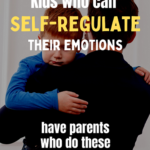Communicating with your kid might often seem like a genuine dilemma. You could find it tough to make sure kids grasp what’s right and what’s wrong. But it’s really crucial to be crystal clear about the regulations. If things become all muddled up, or if your kid believes the rules alter depending on the scenario, it may lead to loads of confusion and stress for both of you.
So, what should you do? Well, sit down with your kid well before any concerns come up. Talk to them about what you expect from them and what will happen if they misbehave. Make it clearly obvious that when they breach a rule, there’s no place for discussion. Let them know that you aim to be strict in your discipline. Some regulations, especially those governing their safety, health, and well-being, should never be up for argument. Others may be addressed freely and honestly, and you can work together to come up with an arrangement that both you and your kid can get behind.
Read also: Smart Way to Build Your Child’s Self Esteem
If required, you may even establish a contract with your kid. This contract should be prepared in basic terms that your youngster may readily comprehend. For smaller kids, you may put a good conduct chart in the contract. Each week kids go without violating any rules, they win a special activity. This is like a prize for their excellent conduct, and it teaches them that doing the right thing may lead to happy moments with mom and dad.
Remember, the purpose of discipline is to educate your kid what’s appropriate and what’s not. Sometimes it can seem like kids simply want to violate all the rules, but deep down, they realize that these regulations are meant to keep them safe, healthy, and help them develop into responsible individuals who can make sensible decisions.
Now, let’s delve a bit more into why creating clear rules and consequences is so important:
No More Confusion: Think of rules as a road plan for your child’s conduct. When the rules are clear and consistent, it’s like having clear road signs that assist your youngster navigate life. They won’t get lost or feel unclear about what they should do.
Safety First: Some regulations are non-negotiable since they’re all about keeping your youngster safe. Things like looking both ways before crossing the street or avoiding touching hot stoves are regulations that are set in stone. Your youngster has to realize that these rules are not available for debate.
Healthy Habits: Other guidelines can be about eating healthy meals, getting adequate sleep, or cleaning their teeth. These are regulations that promote their health and well-being. It’s critical to make sure your youngster understands why these guidelines are important for them.
Learning Responsibility: Setting and observing rules also teach your kid responsibility. It teaches kids that actions have repercussions, whether good or bad. If they accomplish something nice, they are rewarded. If kids breach a rule, there are repercussions, which helps children learn to make better choices in the future.
Preparing for Adulthood: Your child won’t be a youngster forever. They’re growing up, and part of that development is learning how to make sensible judgments. The guidelines you establish today are like building bricks for their future. They’re learning the basics of good and wrong, which will guide them as they grow more autonomous.
Respecting Others: Following regulations also teaches your youngster about respect. It teaches them that they need to follow your direction and the rules you’ve established. It’s a useful lesson in knowing limits and social standards.
Creating a Happy Home: When everyone in the family knows the rules and follows them, it produces a happier and more tranquil home atmosphere. Less fighting and more collaboration make for a more pleasant environment to live.
So, the next time you sit down with your kid to speak about rules and punishments, remember that you’re not simply laying down the law. You’re teaching kids the skills they need to navigate life effectively. It’s like you’re their guide, helping them make sense of the world around them. And as kids develop, they’ll learn to recognize the necessity of the rules you establish, even if they seem a little strange or rigid at times.




